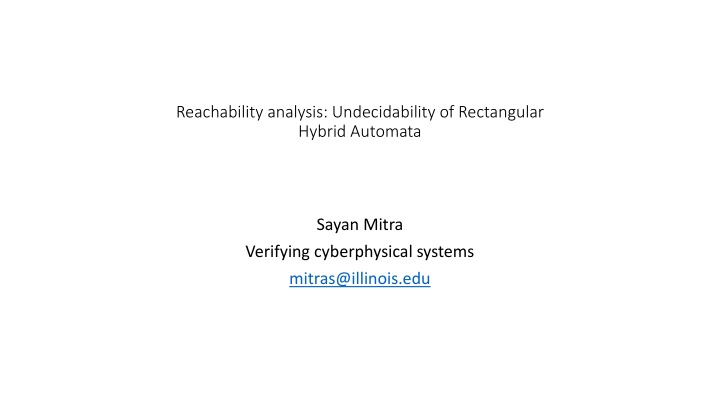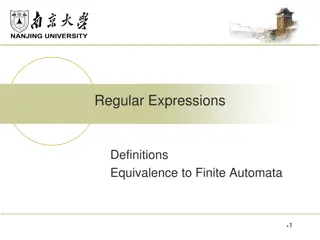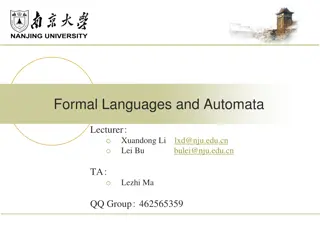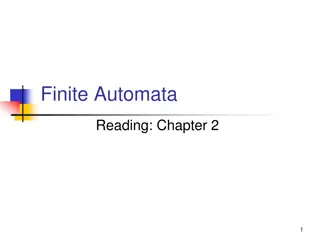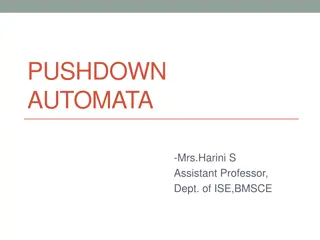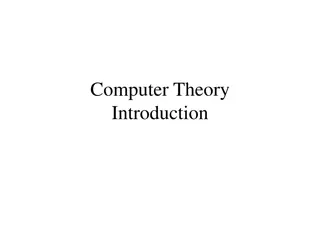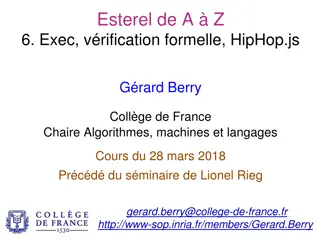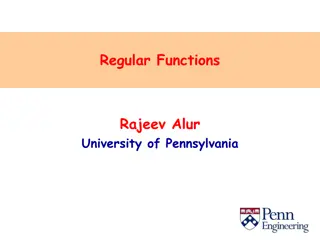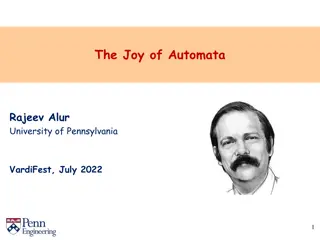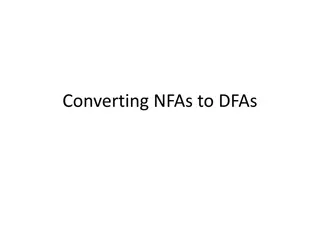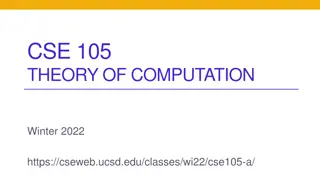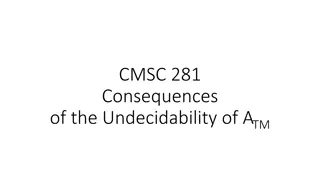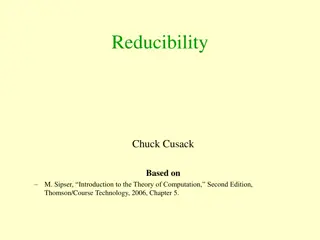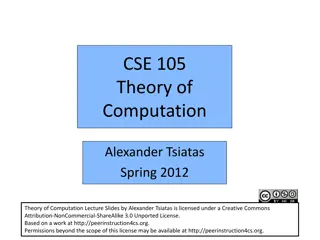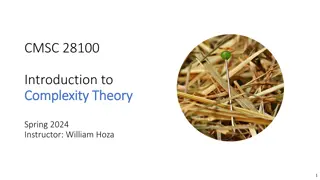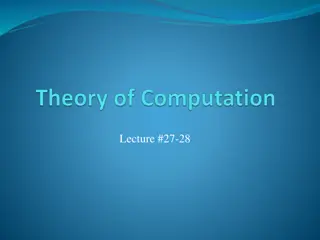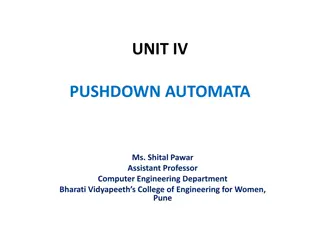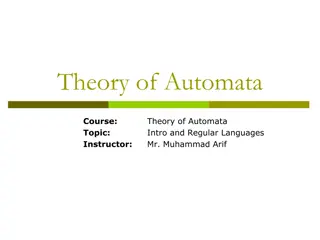Undecidability in Rectangular Hybrid Automata Analysis
The undecidability of the reachability analysis in rectangular hybrid automata (RHA) poses challenges for verifying cyber-physical systems. This complexity was demonstrated through a reduction from the Halting problem of two counter machines by Henzinger et al. Additionally, the review of computability theory highlights the complexities of recursively enumerable languages. General reductions and the concept of counter machines further illustrate the challenges in decision procedures for hard problems.
Download Presentation

Please find below an Image/Link to download the presentation.
The content on the website is provided AS IS for your information and personal use only. It may not be sold, licensed, or shared on other websites without obtaining consent from the author.If you encounter any issues during the download, it is possible that the publisher has removed the file from their server.
You are allowed to download the files provided on this website for personal or commercial use, subject to the condition that they are used lawfully. All files are the property of their respective owners.
The content on the website is provided AS IS for your information and personal use only. It may not be sold, licensed, or shared on other websites without obtaining consent from the author.
E N D
Presentation Transcript
Reachability analysis: Undecidability of Rectangular Hybrid Automata Sayan Mitra Verifying cyberphysical systems mitras@illinois.edu
Is this problem decidable? No [Henz95] Thomas Henzinger, Peter Kopke, Anuj Puri, and Pravin Varaiya. What's Decidable About Hybrid Automata?. Journal of Computer and System Sciences, pages 373 382. ACM Press, 1995. We will see that the CSR problem for rectangular hybrid automata (RHA) is undecidable This implies that automatic verification of invariants and safety properties is also impossible for this class of models The result was shown by Henzinger et al. [1995] through a reduction from the Halting problem of two counter machines
Recall from review of computability theory There is a language L such that L is Recursively Enumerable (RE) but not Recursive That is, it halts on accepting inputs but not guaranteed to do so on all inputs ? ???= { ? | ? ???? ?? ?} This is the set strings that encode Turing Machines that halt (without any inputs)
Reduction from Halting Problem for 2CM Yes 2CM Halting problem: p Translator f(p) CSR for RHA: f(p) CSR algorithm for Rectangular HA No 2 CM Halting problem decider Suppose CSR for RHA is decidable If we can construct a reduction from 2CM Halting Problem to CSR for RHA then 2CM Halting problem is also decidable
General reductions: Using known hard problem B to show hardness of A Instance of B (known to be hard) Yes Translator f: B A instance of A Problem A No Decision procedure for B Given B is known to be hard Suppose (for the sake of contradiction) A is solvable If we can construct a reduction f: B A (from B to A) then B becomes easy, which is a contradiction
Counter Machines An n-counter machine is an elementary computer with n-unbounded counters and a finite program written in a minimalistic assembly language. More precisely: A 2-counter machine (2CM) is a discrete transition system with the following components: Two nonnegative integer counters C and D. Both are initialized to $0$. A finite program with one of these instructions at each location (or line): INCC, INCD: increments counter C (or D) DECC, DECD: decrements counter C (or D), provided it is not 0, JNZC, JNZD [label]: moves the program control to line label provided that counter C (or D) is not zero.
Example 2CM for multiplication A 2-counter machine for multiplying 2x3 is shown below. INCC; INCC; INCD; INCD; INCD; DECC; JNZC 3; % C = 2 % LOOP % Jump to LOOP % HALT Exercise: Show that any k-counter machine can be simulated by a 2CM.
Halting problem for 2CM A configuration of a 2CM is a triple (pc, C, D) pc is the program counter that stores the next line to be executed C, D are values of the counter A sequence of configurations (pc0, D0, C0), (pc1, D1, C1), is an execution if the ith configuration goes to the (i+1)st configuration in the sequence executing the instruction in line pci Given a 2CM M a special halting location (pc_halt), the Halting problem requires us to decide whether all executions of M reach the halting location Theorem [Minsky 67]. The Halting problem for 2CMs is undecidable.
Reduction from 2CM to CSR-RHS We have to construct a function (reduction) that maps instances of 2CM-Halt to instances of CSR-RHA
Reduction from 2CM to CSR-RHS Program counter pc Counters C, D Instructions (program) Halting location Locations, sequence of locations Clocks c, d that can go at some constant rates ?1,?2, Transitions: widgets Particular location / control state (to which we will check CSR)
Idea of reduction (an RHA compiler) Two clocks INCC ? ?+1 ?2 ?1 ?2 ?1 ?2 ?1 ?2 ?1 ? = ?1 ?1 = ? ? d = ?1 DECC ? 1 ?2 ?1 ?1 ?2 after ?1 checking nonzero ? < ?1 = ?
A widget implementing INCC First outgoing transition sets ? = ?2? and the next outgoing transition sets c = ? 1 ?1
Putting it all together Yes 2CM: Translator f(p) CSR-RHA CSR algorithm for Rectangular HA INCC INCC DECC JNC 1 DECC HALT No 2 CM Halting problem decider Suppose CSR for RHA is decidable If we can construct a reduction from 2CM Halting Problem to CSR for RHA then 2CM Halting problem is also decidable Theorem: Theorem: CSR for RHA is undecidable
